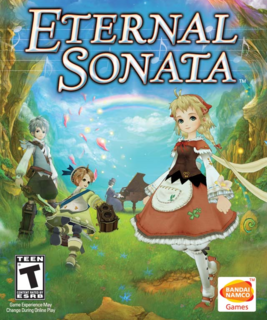The dream world of Eternal Sonata is gorgeous to look at, but consistent progression problems hamper it significantly.
Seeing as this is a musician's dream, it would be rather anti-climatic if Eternal Sonata didn't have high-quality sound design. Luckily, this isn't a problem because the music almost always fits the situation. There are even some compositions by Chopin himself, accompanied by some information about the man during chapter intermissions. It's not all about Chopin, though, as there are plenty of characters who play their part.
The dynamic duo of Allegretto and Beat are the first you'll meet; the pair live life rough on the streets of the port town Ritardondo, stealing bread for themselves and their fellow street urchins. Extortionate taxes force the pair into this unsavoury lifestyle, so they head out on a quest to get them lowered. Meanwhile, in the secluded village of Tenuto, a lonely girl named Polka is reflecting on her life. Cursed with a terminal disease and blessed by its side-effect – the ability to cast magic - she leads a melancholic existence. Fear of contagion repels all but her mother away. Determined to make the most of her short life, she wants to make a mark on this dream world. And then we have the star of the show, Mr Chopin himself. Frederic walks this world of his own creation trying to make sense of what's happening and pondering the point at which a dream becomes reality.
Unfortunately, most of the characters don't live up to their lofty billings. Their colourful and exuberant appearances are contrasted by disappointing one-dimensional personalities. Each slots into a tried-and-true cliché (Allegretto and Beat the "Robin Hoods" and Polka the damsel in distress) for the most part, and the voice acting certainly does Eternal Sonata no favours in this respect. Polka's voice is whiny and grating while Frederic speaks with an overzealous, melodramatic tone that suggests the voice actor was trying a little too hard. Outside of the main party, there aren't any villains that you'll remember in ten years time.
The overarching plot can be difficult to follow due to questionable story progression. It's a real shame because the plot is interesting; the disjointed nature in that it unfolds is what lets it down, and you can't help but feel Eternal Sonata is extremely structured. You play out a section that gives you a lot of the plot to digest, and then you're thrust into a dungeon that holds little context to the overall goal. You don't feel as though there is any purpose of trawling through these dungeons. They're filled with enemies, the odd puzzle, and a boss battle at the end – extremely monotonous and, at times, frustrating. If it weren't for the marvellous art style (I doubt you'll find a more beautiful looking sewer than Ritardondo's), these sections would be without any merit. Some careful planning could have given them a sense of purpose which would hold the player's interest rather than have them pointlessly run around a cave.
An engaging combat system ensures that you won't be totally bored by the lacklustre dungeon segments. The action takes place in real-time within the confines of a 3D arena, taking turns with the AI to attack. You've got five seconds to unleash as much pain as you can, but the best thing about combat is how rewarding and challenging it becomes. As you reach certain points in the game, you'll gain a new party level. As you level up, your time meter gets smaller but you gain useful benefits such as the ability to equip more than one special skill. Cutting your time may seem like a cheap way to create challenge, but using your newfound skills to dispatch enemies with smaller time constraints is very rewarding.
What really makes combat interesting is the light/dark dynamic. Each character can use special attacks, but the ones you can use depend on where you're standing on the battlefield. It's an odd concept that works surprisingly well, especially since your enemies are affected by it too. Some of your foes might become extremely powerful in the shade, so you have to think up ways to get them into the light before you take them down. Luring them out, unleashing a special attack with knock-back, or using an item that causes the target to radiate light are all examples of how the game demands you think before you act.
In terms of creativity and artistry, you can't deny that Eternal Sonata is a success. The solid story is painted with beautiful visuals unlike anything before it, and the creativity expands into the fairly odd, yet rather enjoyable, combat system. After considering all this, it's a shame that the general progression lets it down. The blatant story-dungeon-story-dungeon structure would have been far more bearable if the dungeons were planned better. It feels like a dungeon-crawler at times, and although the puzzles aren't particularly tough, their sometimes-confusing nature causes a lot of artificial challenge. Ultimately, Eternal Sonata is something different. In a genre saturated with teens wielding huge swords, five-form final bosses, and the active time battle system, it's undeniably a breath of fresh air if only on the basis of its story and art style. The fact that it's different doesn't save it from the downfalls, but if you can put up with it, you'll find plenty to enjoy in this twenty-to-thirty hour adventure.

